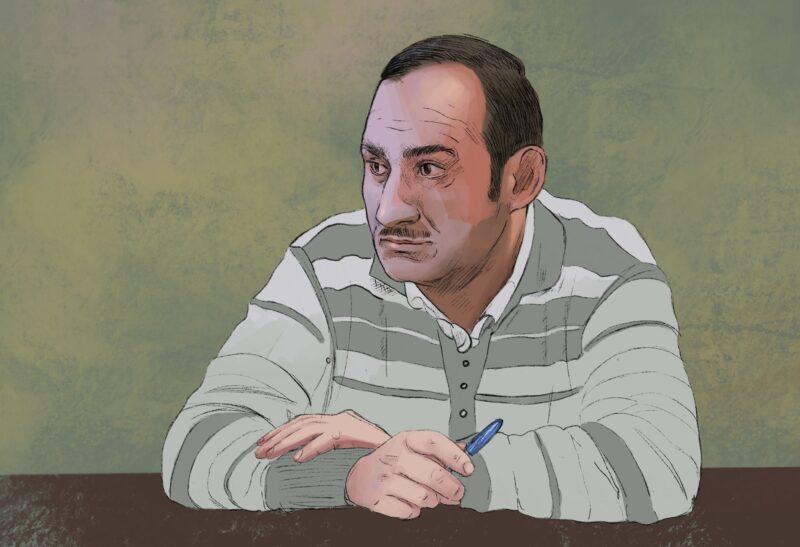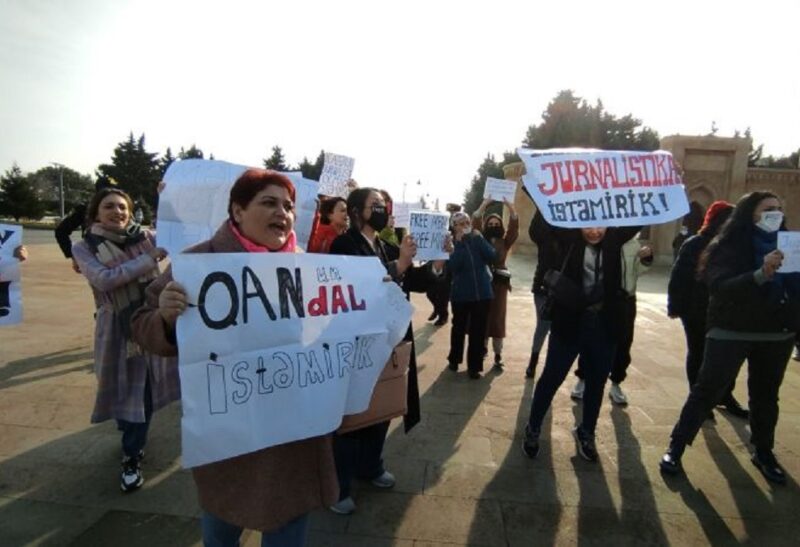

October 27 marked 16 months since I was sent to prison. I had therefore completed a third of my total sentence. The following day, I filed an application with the Karadagh district court citing Article 71 of the Criminal Code and Article 170 of the Criminal Procedures Code, and requesting the remainder of my sentence be replaced with corrective [community] labour as envisaged by Article 42 of the Criminal Code. There should have been no real obstacle to approving this application as I had not received any reprimands or broken any rules while in jail.
Of course that was in theory only, since everything depended on orders from on high.
Another political prisoner, Qurban Mammadov, filed a similar application at the same time. On the morning of November 7, the deputy director for education at the prison, Natiq Hajiyev, informed us that our court hearings would take place at 15:00. This was something of a surprise for us since such petitions are usually heard 30 or 40 at a time. We sensed that the Karadagh prison administrators did not want to be embarrassed by releasing genuine criminals and not us. This sense of embarrassment seemed a positive thing.
At 15:00 we were summoned to the prison’s administrative offices by tannoy. Since there were no courtroom facilities, we gathered in Hajiyev’s small office. The hearing was conducted in the presence of Judge Rashad Mammadov, prosecutor Farahim Huseynov, state-appointed lawyer Shukur Shikhiyev, and Hajiyev, representing the prison.
I was allowed to speak once the hearing started, and I set out my request in brief. After that, Hajiyev spoke and confirmed that I had not breached the rules of prison conduct while there. He described me as a taciturn, nervous person. He said, “Prisoner Yadigar Sadiqov is well disposed towards education, is well-developed intellectually and is a frequent visitor to the prison library, but is unfortunately not keen on work. He does not take part in tidying and planting the prison grounds, and does not like common labour activities. He does not admit his guilt or express repentance, he does not accept the verdict or sentence passed by the authorities, and he asserts that his imprisonment is groundless.”
By the time Hajiyev had finished speaking, we knew what the outcome of the hearing would be, in other words decision had made higher up. The arguments I had made were all for nothing. Since the regime prevent me from taking part in public debate, I had no chance in here. My impromptu speech undoubtedly had as little effect on Judge Mammadov as my hour-long closing remarks (which took me 20 days to write) had on Judge Elchin Qasimov at my trial in Lenkoran. It was just an exchange of remarks, one might say.
Anyone who knows me will find it hard – as I did too – to comprehend the description of me as nervous and taciturn. But that was a mere pretext. I can’t complain, since Qurban was described as an “egotist”. I just hope the prison management is able to correct these negative characteristics of ours before we are released.
The argument that I am unwilling to work is absurd. The Criminal Code and Criminal Procedures Code are founded on two Soviet-era concepts. One is collectivism – the idea that the interests of society are higher than those of the individual. Someone commits a crime and harms society, and they must therefore engage in useful productive labour. The other point is that people who live by the [criminal world’s] rules in prison will refuse to work and instead live off the proceeds of crime. The convict who engages in hired labour cannot rise up the criminal hierarchy to be accorded the title of “thief” [crime boss]. The convict who stoops to labour alienates himself from the world of professional crime.
Soviet ideology had it that labour had powers to transform even a monkey into a human being, and and hence it must certainly reform the criminal.
A lot has changed since then. Every prison used to have an “industrial zone”. These have now been abolished, and the penal institution is called a detention unit. It is no longer standard practice to use labour to reform convicts. Some still do work, however – as cleaners, warehousemen, barbers, tailors, cobblers and so on. They get paid 100 manats a month.
If I am not going to be paid, it is absurd to require me to work. That is aside from the fact that the main reason I was jailed was because I wanted to work for a better future for my country, and it is equally absurd to accuse someone of being workshy when he has been in employment for 17 years and spent much of it teaching. The most comic aspect of it all is that a regime that prevented me working on the outside and deprived me of the profession I loved now wants to keep me inside on the pretext that I don’t want to work.
After the hearing, I remembered seeing on the internet a sign saying “Arbeit macht frei” which hung over the entrance to the Auschwitz camp. I think we need a similar sign for penal institutions here so that we know what work awaits us.
Yadigar Sadiqov, a leading figure in the opposition Musavat party, is in prison in Azerbaijan.



